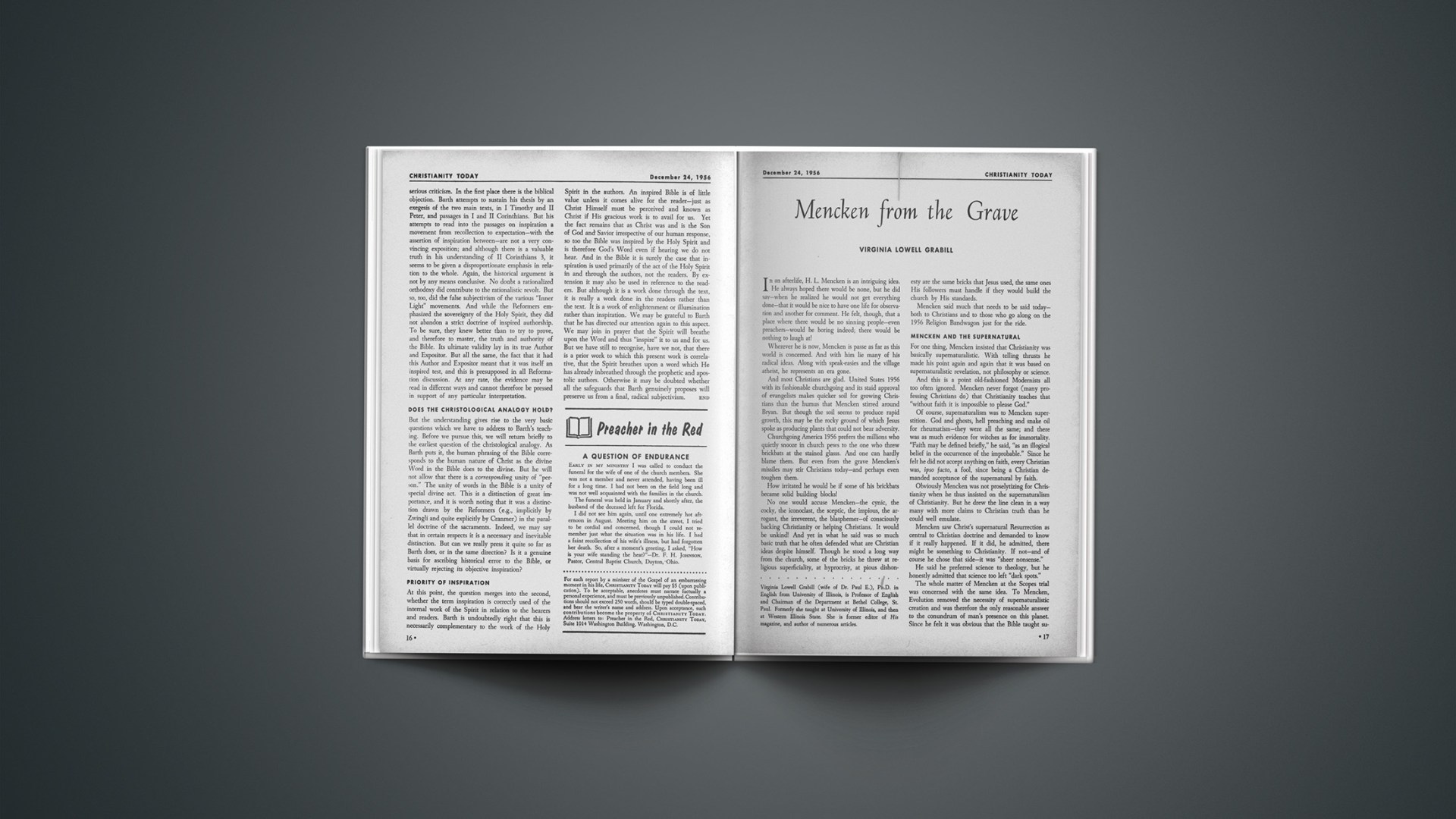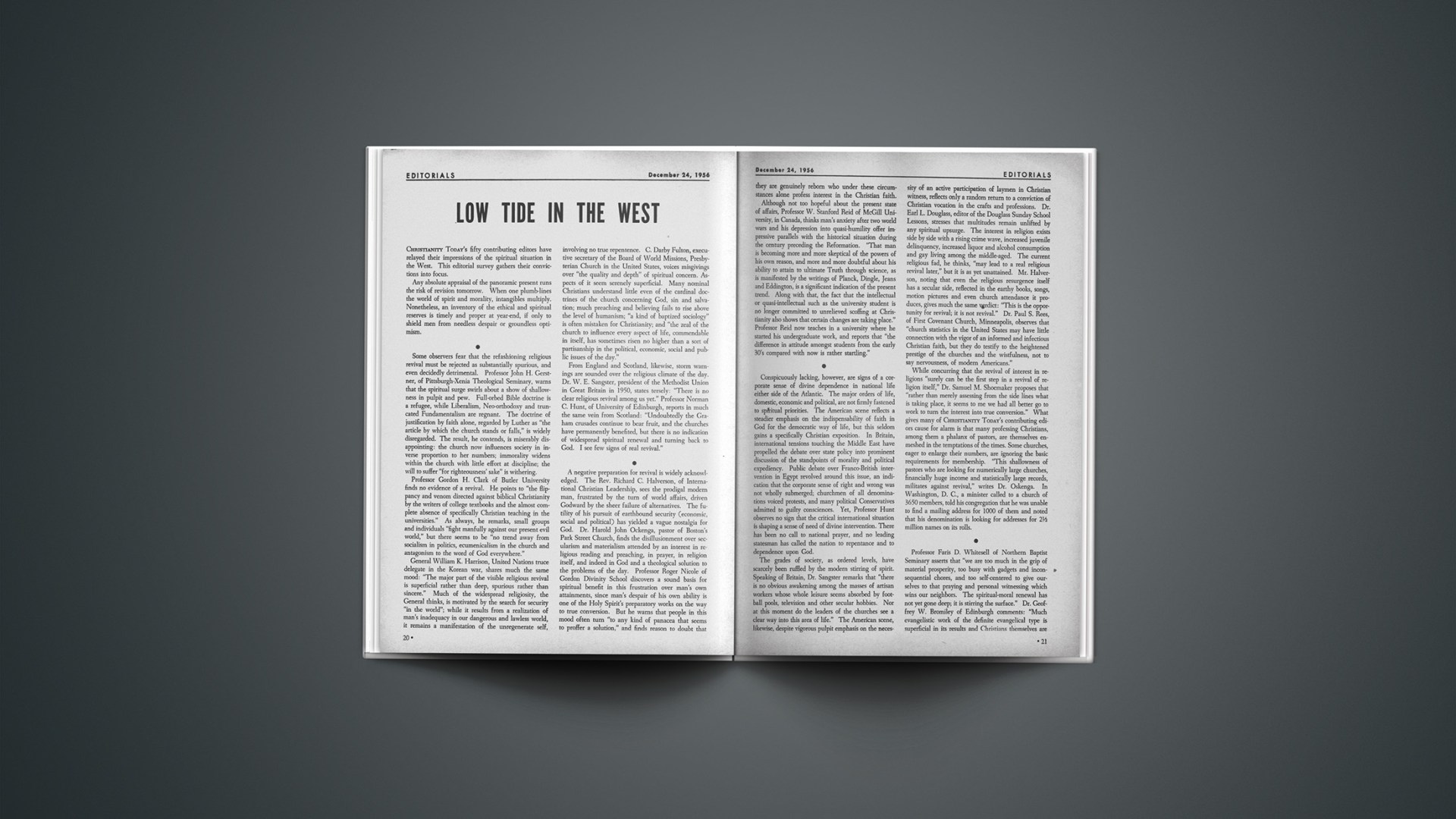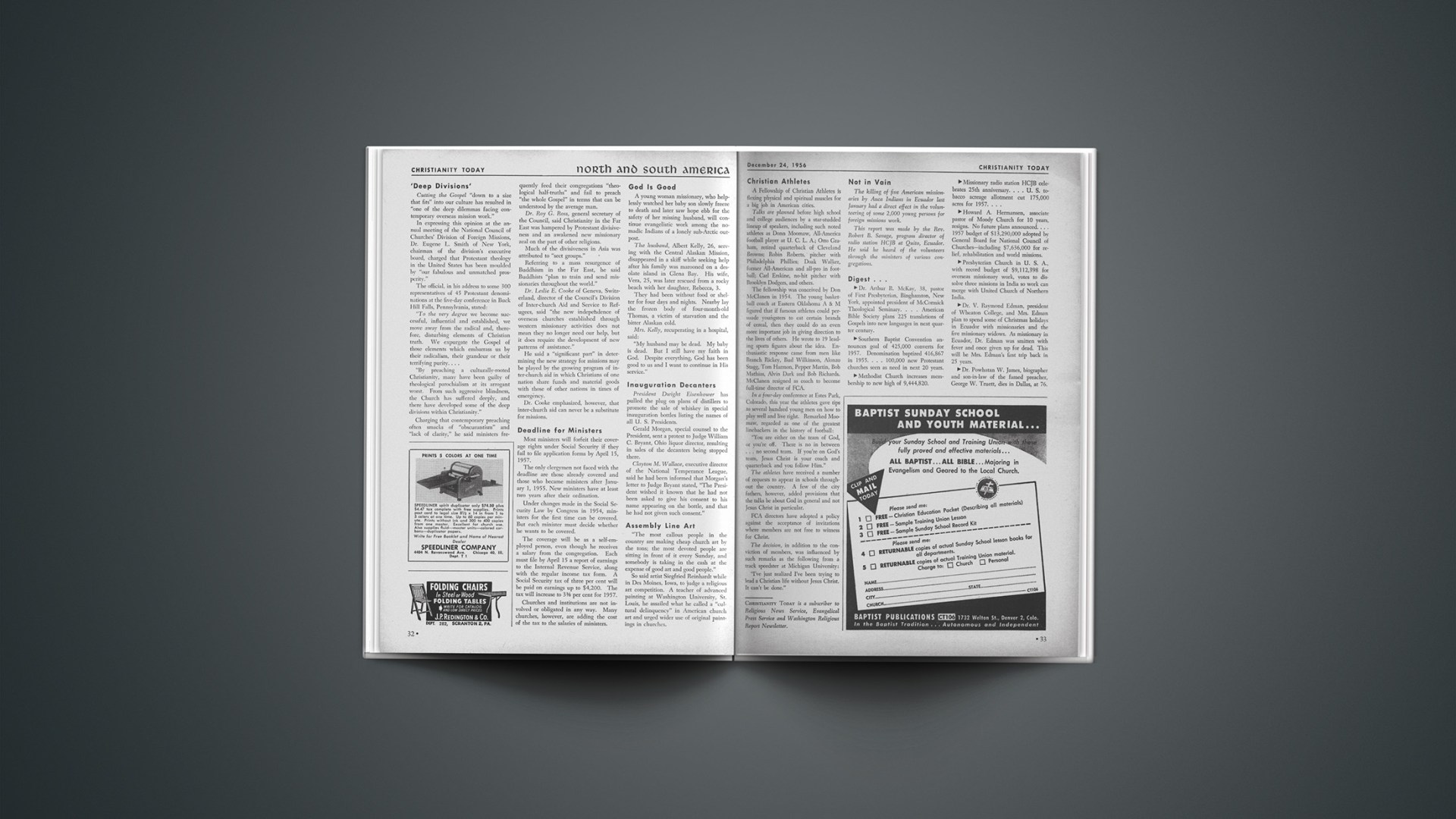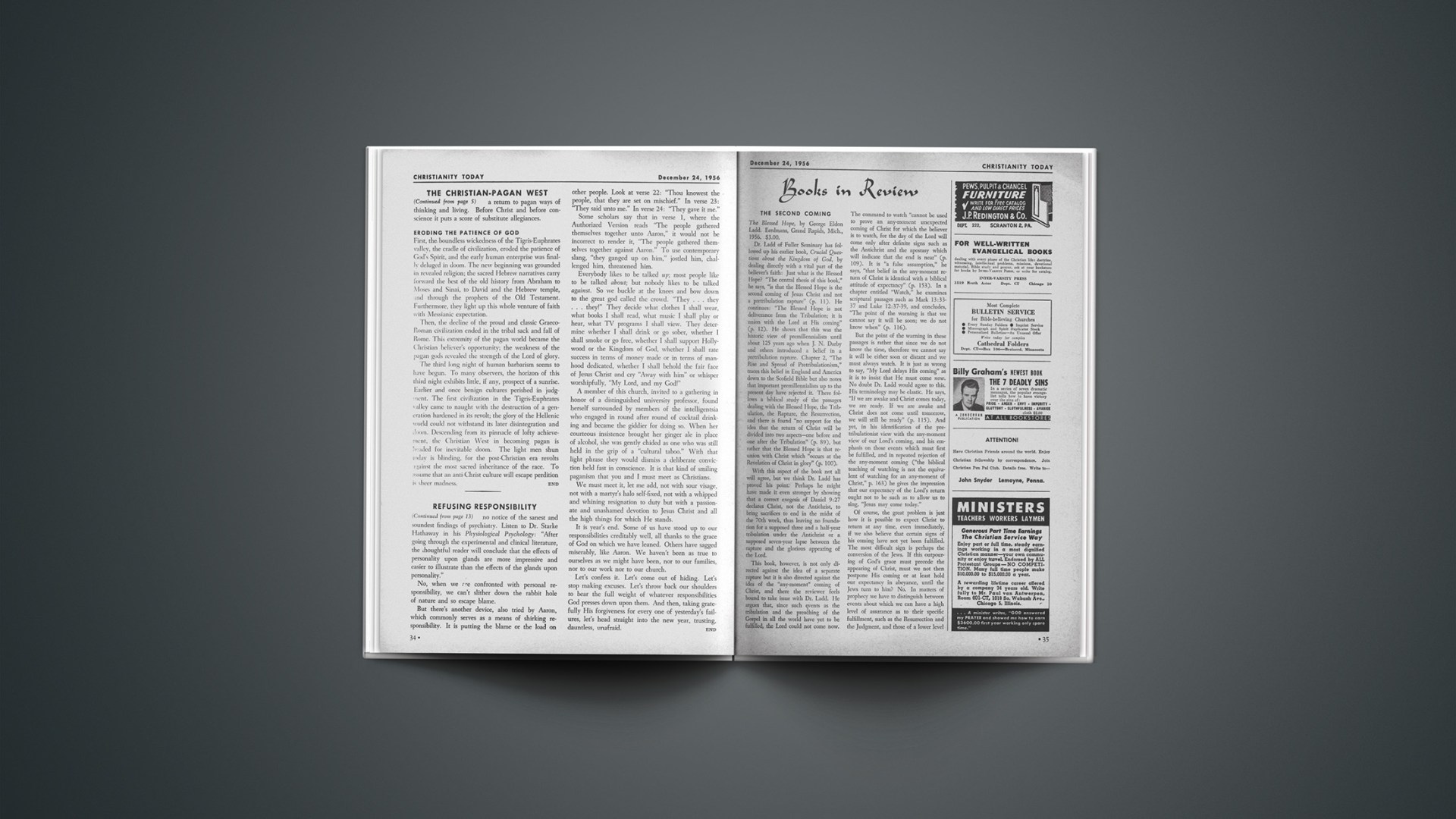In an afterlife, H. L. Mencken is an intriguing idea. He always hoped there would be none, but he did say—when he realized he would not get everything done—that it would be nice to have one life for observation and another for comment. He felt, though, that a place where there would be no sinning people—even preachers—would be boring indeed; there would be nothing to laugh at!
Wherever he is now, Mencken is passe as far as this world is concerned. And with him lie many of his radical ideas. Along with speak-easies and the village atheist, he represents an era gone.
And most Christians are glad. United States 1956 with its fashionable churchgoing and its staid approval of evangelists makes quicker soil for growing Christians than the humus that Mencken stirred around Bryan. But though the soil seems to produce rapid growth, this may be the rocky ground of which Jesus spoke as producing plants that could not bear adversity.
Churchgoing America 1956 prefers the millions who quietly snooze in church pews to the one who threw brickbats at the stained glasss. And one can hardly blame them. But even from the grave Mencken’s missiles may stir Christians today—and perhaps even toughen them.
How irritated he would be if some of his brickbats became solid building blocks!
No one would accuse Mencken—the cynic, the cocky, the iconoclast, the sceptic, the impious, the arrogant, the irreverent, the blasphemer—of consciously backing Christianity or helping Christians. It would be unkind! And yet in what he said was so much basic truth that he often defended what are Christian ideas despite himself. Though he stood a long way from the church, some of the bricks he threw at religious superficiality, at hyprocrisy, at pious dishonesty are the same bricks that Jesus used, the same ones His followers must handle if they would build the church by His standards.
Mencken said much that needs to be said today—both to Christians and to those who go along on the 1956 Religion Bandwagon just for the ride.
Mencken And The Supernatural
For one thing, Mencken insisted that Christianity was basically supernaturalistic. With telling thrusts he made his point again and again that it was based on supernaturalistic revelation, not philosophy or science.
And this is a point old-fashioned Modernists all too often ignored. Mencken never forgot (many professing Christians do) that Christianity teaches that “without faith it is impossible to please God.”
Of course, supernaturalism was to Mencken superstition. God and ghosts, hell preaching and snake oil for rheumatism—they were all the same; and there was as much evidence for witches as for immortality. “Faith may be defined briefly,” he said, “as an illogical belief in the occurrence of the improbable.” Since he felt he did not accept anything on faith, every Christian was, ipso facto, a fool, since being a Christian demanded acceptance of the supernatural by faith.
Obviously Mencken was not proselytizing for Christianity when he thus insisted on the supernaturalism of Christianity. But he drew the line clean in a way many with more claims to Christian truth than he could well emulate.
Mencken saw Christ’s supernatural Resurrection as central to Christian doctrine and demanded to know if it really happened. If it did, he admitted, there might be something to Christianity. If not—and of course he chose that side—it was “sheer nonsense.”
He said he preferred science to theology, but he honestly admitted that science too left “dark spots.”
The whole matter of Mencken at the Scopes trial was concerned with the same idea. To Mencken, Evolution removed the necessity of supernaturalistic creation and was therefore the only reasonable answer to the conundrum of man’s presence on this planet. Since he felt it was obvious that the Bible taught supernaturalistic creation, Evolution proved Christianity again a fool’s philosophy. In the same way he believed Copernicus’ discovery not only proved that the earth revolved around the sun but also that the “Old Testament was rubbish” instead of revelation. There is little indication that he would have been intrigued by the problems of metaphor, myth, and symbol that contemporary Christian thinkers struggle with. If the angel blew from the “four corners of the earth,” then the earth was square; and, since it had been proved not to be, then the Bible was false and irrelevant. Within his naturalistic presuppositions there could have been no honest alternative in any event.
Men are civilized, Mencken said, in proportion to their readiness to doubt. The larger a man’s stock of faith and “adamantine assurances,” the more stupid he was in Mencken’s eyes. Perhaps there would be fewer wrangles and splits in Protestant churches if Christians reserved their faith and “adamantine assurances” for the essential and supernaturalistic elements of their faith and allowed some of Mencken’s doubt to creep into their vociferously held opinions on other matters.
Mencken sometimes seems to be battling windmills or adolescents converted last Saturday night—youths who know the seven steps to becoming and remaining Christian and are sure that these cover everything necessary. Mencken seems to think that all Christians, like enthusiastic youths, believe they can reason out or know the answer to every question. He’s there to assure them that they can’t. But not all Christians are as stupid as he makes them out; some not only hold to the Christian truth which the human mind can understand but also unabashedly believe the Christian revelation of those things which have not “entered into the heart of man.”
Words From The Silence
Mencken’s pronouncements and example in regard to the use of words is another way he can speak to Christians even from the grave. He has been called the greatest prose stylist America has produced. He loved to shock and overstate. He insisted on being read. And he worked at finding a vital idiom that would arouse interest. He wanted American language for Americans. He liked the specific, concrete, even vulgar word because it got the meaning across sharply.
This is the impulse that provides a new rendering of the Bible every few years. This is the contention of teachers of English and of religious journalism or creative writing in Christian colleges when they red-pencil out the religious cliche and the jargon that is meaningless to the uninitiated and worn out to the rest.
Mencken tried a body blow to religious shibboleths by using cliches for satiric purposes—e.g., signing his letters “I pray for you constantly.”
Christian writers almost without exception can learn in Mencken’s school. Vital truth deserves vital garb.
Ideas That Smash Idols
Obviously it was not his language alone that made Mencken readable and also read. He had ideas and he scattered them freely although he said that the average man prefers cliches and resents new thoughts. Mencken knew how to ask questions. Few Christians—even the propagandists—excel in either of these areas. What campus pastor can hold a group of sophomores spellbound for twenty minutes of listening the way Mencken could through a long essay? And then give them enough for a week’s bull sessions in addition? If one can, let him then try a group of Saturday night stein wavers like those Mencken delighted every week!
Admittedly it is easier to be exciting when one’s ideas are iconoclastic like Mencken’s. But there are some things in Christianity that might smash a few idols too if they were preached interestingly. And what Christian would be ready to admit that Christianity is potentially less exciting than Menckenism?
You name it and Mencken had an idea on it—language, politics, food, literature, liquor, religion, music, minorities, liberty, democracy, Puritanism, sex, the theater, etiquette, prohibition, and a hundred others.
And if he didn’t have an idea—or more especially if he did have—he could ask a good question, particularly about Christianity and its application. He asked the tough questions professing Christians often don’t dare ask: Is Christianity a matter of deeds or beliefs? How far can human reason go? Can a man be a hypocrite and a Christian at the same time? Why do mission bums listen to the preaching? Who is qualified to censor the press? How do we know that God hasn’t turned the world over to a lesser deity to operate? What was the origin of the double standard? What is the psychological basis of commercial morality? Why do churchmen believe it unlucky to meet a black cat and lucky to find a pin? What happens at death? Why are artists so often scoundrels? Is the soul merely the product of wishful thinking? How does a man decide to be a martyr for a religious belief?
What could not a Menckenesque Christian—preacher or teacher or parlor conversationalist—do for the Christian cause?
One Day At A Time
Though he may not have realized it—and would surely have been irritated to have it pointed out—Mencken agreed with Jesus that men ought to live one day at a time. He declared that he woke every morning to an interesting life in which there were still men who were “worse asses” than he! His version of the day-by-day walk—to get through life with the least possible pain and the most possible entertainment—is different from Christ’s “sufficient unto the day is the evil thereof” in its selfishness but not in its emphasis on living one day at a time.
With this idea, it is foregone that Mencken would be hard on the pie-in-the-sky boys who live not for today but only for the rewards of the future. He declared that a mountebank who thought only of “tomorrow’s cakes” would be less dangerous with power than a “prophet and martyr” living for rewards in heaven.
In this he turns the light of truth on the professing Christian who is merely in it for what he can get—who tithes because he believes he will become richer, who serves the church for fifty years so that he may wear a crown for eternity—the irreligious of the class of Peter when he asked, “What then shall we have?” The tragedy of Mencken was of course that he missed entirely the biggest thing in the life lived one day at a time.
The Art Of Puncturing Frauds
For all his exaggeration and posing—he apparently often took the side least likely to succeed simply for kicks—Mencken was refreshingly honest on important issues. He curried favor with no one and punctured frauds wherever he found them. He did not aim for popularity; he aimed for truth and scorned those who, he felt, did not.
He believed that religion hurt clear, honest thinking. He felt that religious people cared nothing for the truth so long as they retained “a hopeful and pleasant frame of mind.” That he was shockingly close to right can be easily demonstrated by the perusal of a dozen stories in so-called “Christian literature”—papers and books produced by religious presses. With sickening monotony they present a world where life is pleasant for the good, where sinners are few and soon fail, die, or get converted, where the Christian—especially the preacher—can do no wrong. Mencken, along with old and new orthodoxy alike, saw men as sinners. “Man is inherently vile,” he said, “but he is never so vile as when he is trying to disguise and deny his vileness.”
Mencken hated hypocrisy and untruth. And he made no bones about it.
Though he had no time for the homo boobus, Mencken loved individual liberty. And he fought hard for it. Whether the ban was Prohibition or a statute preventing the election of Socialists, the prosecution of young people who talked against war, the prevention of the teaching of Evolution, or Boston’s Watch and Ward Society’s Index, he battled. He was willing to suffer personal loss when he felt that the personal liberties of others were at stake.
In our day when religion is popular we too often forget that it was individuals whom Christ came to free—not majorities that He came to enslave. We forget too that it behooves us to defend the freedom of minorities in every age because we are bound to be a minority ourselves, since “few there be who find” the Way.
What Mencken overlooked, of course, is that even the minority sometimes champions a freedom that is only a form of slavery after all, and that Christ alone frees man from moral bondage.
Gibes Of A Tamed Cynic
Mencken is dead. And so are many of his opinions. But his scorn of hypocrisy and dishonesty, his insistence on human liberty, his daring to ask questions, his clear and pungent language, his insistence on straight thinking—these still live. And they lived—perhaps less colorfully—in his day too because they are basically Christian.
From his grave even Mencken can help Christians—and even with his brickbats. He can help insofar as he speaks truth. But the Christian must go beyond Mencken’s negations to the positive message which was Christ’s as well—that the supernatural exists and that in it there are answers.
If we do, Mencken may really (though unwittingly) help undo the work of a life spent, we can’t help believing, on the wrong side.
But as we read him how we wish we had some Christain Menckens!
Virginia Lowell Grabill (wife of Dr. Paul E.), Ph.D. in English from University of Illinois, is Professor of English and Chairman of the Department at Bethel College, St. Paul. Formerly she taught at University of Illinois, and then at Western Illinois State. She is former editor of His magazine, and author of numerous articles.
To A Scientist Friend
Your stories of the shrunken sea’s abandonOf palm trees high within a mountain range,And of the tiger (saber-toothed) whose skeletonSunken in tarry pit, defied time’s change,Were open door to where past ages are:Mountain and lake repeat primordial criesOf life and death that echo in my ear.Today this mystery before me lies:These wild bird feathers fallen by the way—Grey clip of wing, quill torn, swirl auburn flame;“Life values I cannot describe,” you say.O ageless woe, and beauty without name,He lives Who heard the ascending creature fall,And ancient shore and lair, forsaken, call.
RACHEL CROWN











